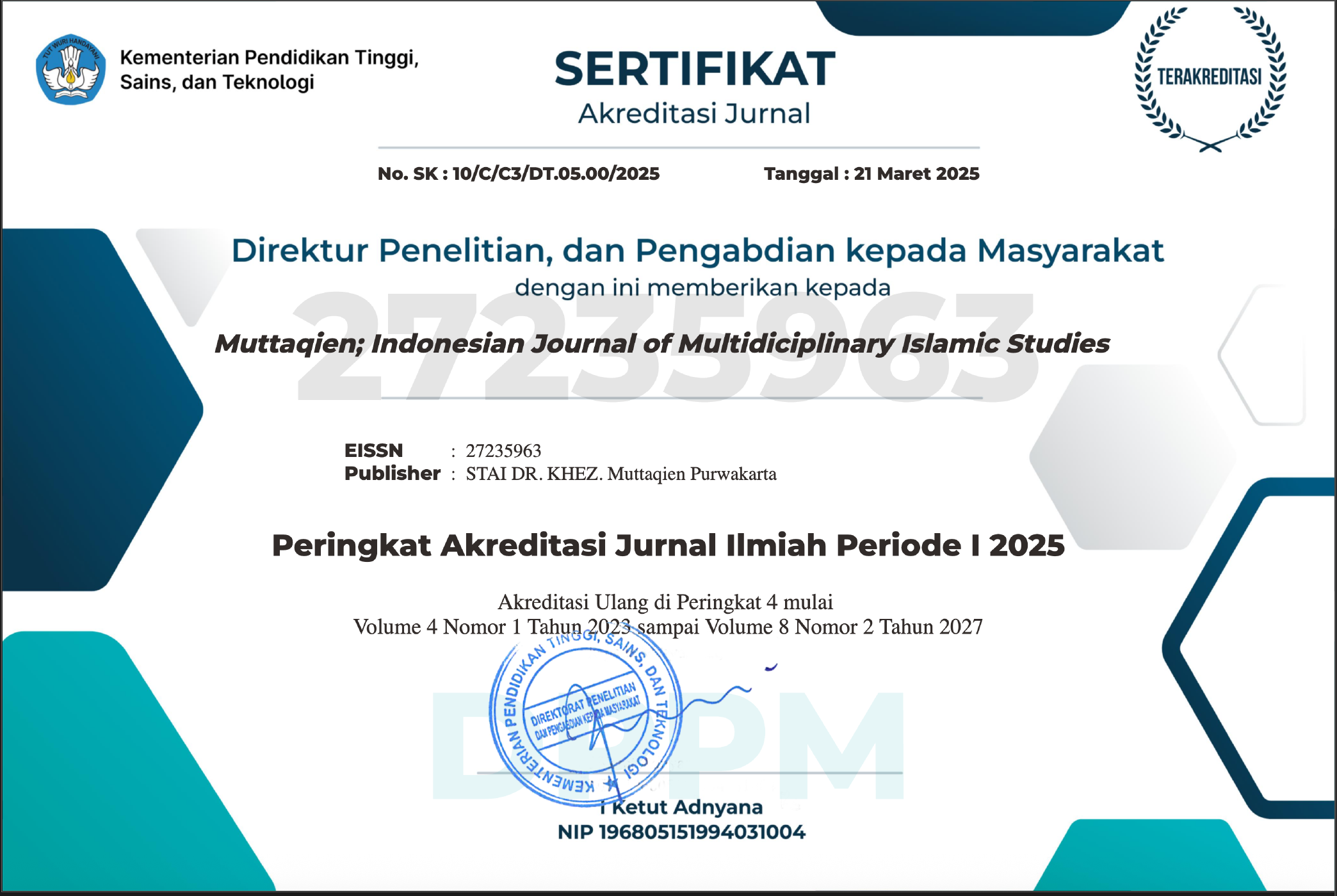Analisis Pesan Dakwah dalam Novel Religi
Keywords:
Dakwah Bil-Qalam, Novel, Pesan Dakwah, Perempuan, Kekerasan terhadap PerempuanAbstract
Da'wah currently can no longer be done in a simple way, the da'wah actors must be able to create their da'wah messages so that the da'wah messages presented can be of interest to the object of their da'wah. Online media are da'wah media that have strong penetration capabilities and high actuality advantages in attracting the object of their da'wah. The purpose of this study was to find out how the objective reality, symbolic reality, and subjective reality of the Al Bahjah Assembly Da'wah Team in Bandung. The type of research used is qualitative research with case study methods. Data obtained through observation, interviews and documentation. The data analysis was carried out by categorizing and reducing data, the data was grouped in the form of narratives, data interpretation, conclusion drawing and verification of the results of data analysis. The conclusions of this study are 1) The objective reality of Al Bahjah's da'wah team is based on the construction of objective reality in accordance with the facts and da'wah messages presented using online media and is based on breakthroughs by cadre of da'i who have multi-skill abilities in both technology and economics. 2) The symbolic reality of Al Bahjah's da'wah team is based on indicators of the creation of da'wah messages. 3) The subjective reality of Al Bahjah's da'wah team lies in the da'wah method through the formulation of the development of online media. The preparation of da'wah planning is carried out systematically, starting from mapping the situation, mapping the object of da'wah and classifying the message of da'wah.
References
Anwar. Chairil, Islam dan Tantangan kemanusiaan Abad XXI, (Yogyakarta : Pustaka Pelajar, 2000)
Bungin Burhan, Konstruksi Sosial Media Massa (Jakarta : Kencana,2008)
Moch Ali Azis, Ilmu Dakwah (Jakarta: Kencana, 2017)
Muhtadi, Asep Saeful. Komunikasi Dakwah (teori, pendekatan dan aplikasi), Bandung: Simbiosa Rekatama Media, 2012
Sukayat Tata. Ilmu Dakwah Perspektif Filsafat Mabadi’ Asyarah, (Bandung: Simbiosa Rekatama Media)
Syam, Nur. Filsafat Dakwah Pemahaman Filosofi Tentang Ilmu Dakwah. Surabaya: Jenggala Pustaka Utama. 2003
Wahid. Fathul, 2004, Dakwah Melalui Internet, Yogyakarta: Gava Media Pratama
Yeni Rachmawati dan Euis Kurniati. (2005). Strategi Pengembangan Kreativitas Pada Anak Usia Taman Kanak-Kanak. Jakarta: Departemen Pendidikan Nasional.
Solihin, W., husna, A. I. N., Fauziah, N., & Mukti, S. (2021). Peran Agama dalam Pembentukan Perilaku Anti-Korupsi. Muttaqien; Indonesian Journal of Multidiciplinary Islamic Studies, 2(2), 143–154. https://doi.org/10.52593/mtq.02.2.04
Paramansyah, A., Husna, A. I. N., & Ernawati, E. (2021). Pengaruh Perhatian Orang Tua terhadap Hasil Belajar PAI Siswa Kelas VII. Reslaj: Religion Education Social Laa Roiba Journal, 3(1), 81-101.
Published
How to Cite
Issue
Section
Muttaqien; Indonesian Journal of Multidiciplinary Islamic Studies allow the author(s) to hold the copyright without restrictions and allow the author(s) to retain publishing rights without restrictions and authors who publish with this journal agree to the following terms:
In developing strategy and setting priorities, Muttaqien; Indonesian Journal of Multidiciplinary Islamic Studies recognize that free access is better than priced access, libre access is better than free access, and libre under CC-BY-SA or the equivalent is better than libre under more restrictive open licenses. We should achieve what we can when we can. We should not delay achieving free in order to achieve libre, and we should not stop with free when we can achieve libre.
Muttaqien; Indonesian Journal of Multidiciplinary Islamic Studies has a CC-BY SA license or its equivalent as the optimal license for publication, distribution, use and reuse of scientific work. This license is under a Creative Commons Attribution 4.0 International License.
You are free to:
- Share — copy and redistribute the material in any medium or format
- Adapt — remix, transform, and build upon the material for any purpose, even commercially.
- The licensor cannot revoke these freedoms as long as you follow the license terms.










